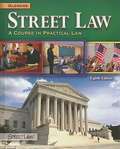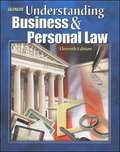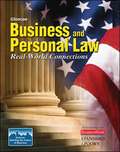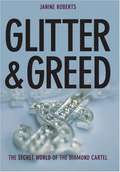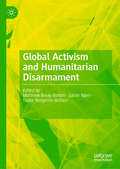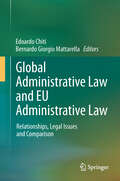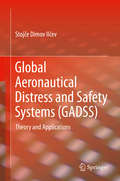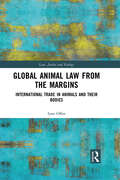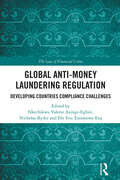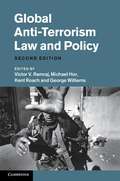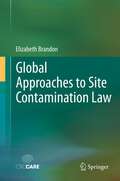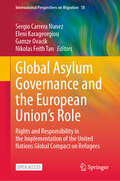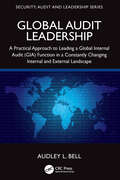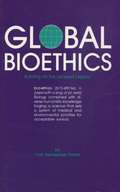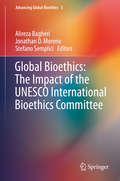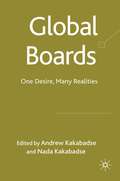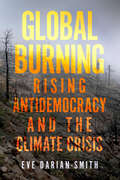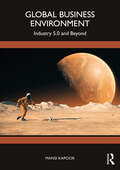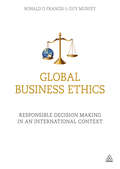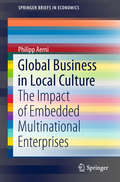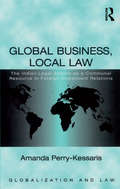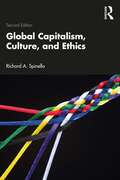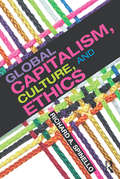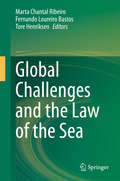- Table View
- List View
Glencoe Street Law: A Course in Practical Law (8th edition)
by Lee P. Arbetman Edward L. O'BrienGAINING A PRACTICAL UNDERSTANDING OF THE LAW AND THE LEGAL SYSTEM. Street Law's interactive methods focus on legal issues relevant to students' lives help students develop the knowledge and skills essential in our law-related society. Features * Intellectual property coverage invites students to consider issues related to ownership of ideas. * Case Studies illustrate legal issues in the context of real-life and hypothetical situations. * Human Rights U.S.A. offers an opportunity to study human rights issues in the United States. * You Be the Judge involves students in considering and deciding the outcome of a legal situation. * Where You Live highlights variations in local law and procedures. * Youth Act helps students learn how to advocate for change in their community and how to solve problems without going to court. * Legal Documents are reproduced in the text to aid students' understanding.
Glencoe Understanding Business and Personal Law (11th edition)
by Gordon W. Brown Paul A. SukysIntroduce students to the laws that affect their daily lives. New elements in every component!
Glencoe, Business and Personal Law, Real-World Connections
by Gordon W. Brown Paul A. Sukys BusinessWeek Standard Poor'SNIMAC-sourced textbook
Glitter and Greed
by Janine RobertsThe result of 20 years research on the diamond trade and De Beers, this book reveals the myths and misinformation in the industry.
Global Activism and Humanitarian Disarmament
by Matthew Breay Bolton Sarah Njeri Taylor Benjamin-BrittonThis book analyses the politics of the humanitarian disarmament community—a loose coalition of activist and advocacy groups, humanitarian agencies and diplomats—who have successfully achieved international treaties banning landmines, cluster munitions and nuclear weapons, as well as restricting the global arms trade. Two campaigns have won Nobel Peace Prizes. Disarmament has long been a dirty word in the international relations lexicon. But the success of the humanitarian disarmament agenda shows that people often choose to prohibit or limit certain violent technologies, for reasons of security, honour, ethics or humanitarianism. This edited volume showcases interdisciplinary research by scholars and practitioners seeking to understand the dynamics and impact of the new global activism on weapons. While some raise concerns that humanitarian disarmament may be piecemeal and depoliticizing, others see opportunities to breathe new life into moribund arms control policymaking. Foreword by 1997 Nobel Peace Prize Laureate Jody Williams.
Global Administrative Law and EU Administrative Law
by Edoardo Chiti Bernardo Giorgio MattarellaThis book seeks to enrich and refine global administrative law and EU administrative law analytical tools by examining their manifold relations. Its aim is to begin to explore the complex reality of the interactions between EU administrative law and global administrative law, to provide a preliminary map of such legal and institutional reality, and to review it. The book is the first attempt to analyze a dense area of new legal issues. The first part of the book contains core elements of a general theory of the relationships between global and EU administrative law: comparative inquiries, exchanges of legal principles, and developing linkages. The second part is devoted to special regulatory regimes, in which global and European law coexist, though not always peacefully. Several sectors are considered: cultural heritage, medicines, climate change, antitrust, accounting and auditing, banking supervision, and public procurement.
Global Aeronautical Distress and Safety Systems (GADSS): Theory and Applications
by Stojče Dimov IlčevThis book presents the principal structure, networks and applications of the Global Aeronautical Distress and Safety System (GADSS) for enhanced airborne Communication, Navigation and Surveillance (CNS). It shows how their implementation works to ensure better security in flight and on the airports surface; improved aircraft tracking and determination in real space and time; and enhanced distress alerting, safety; and Search and Rescue (SAR) system for missing, hijacked and landed aircraft at sea or on the ground. Main topics of this book are as follows: an overview of radio and satellite systems with retrospective to aeronautical safety; security and distress systems; space segment with all aspects regarding satellite orbits and infrastructures; transmission segment of radio and satellite systems; ground segment of radio and earth ground stations; airborne radio and satellite antenna systems and propagation; aeronautical VHF and HF Radio CNS systems and networks; Inmarsat, Iridium and Cospas-Sasrast aeronautical satellite CNS systems and networks; Aeronautical Global Satellite Augmentation System (GSAS) and networks; Digital Video Broadcasting - Return Channel via Satellite (DVB-RCS) standards and Aeronautical Stratospheric Platform Systems (SPS) and networks.
Global Animal Law from the Margins: International Trade in Animals and their Bodies (Law, Justice and Ecology)
by Iyan OfforThis book critically engages the emerging field of global animal law from the perspective of an intersectional ethical framework. Reconceptualising global animal law, this book argues that global animal law overrepresents views from the west as it does not sufficiently engage views from the Global South, as well as from Indigenous and other marginalised communities. Tracing this imbalance to the early development of animal law’s reaction to issues of international trade, the book elicits the anthropocentrism and colonialism that underpin this bias. In response, the book outlines a new, intersectional, second wave of animal ethics. Incorporating marginalised viewpoints, it elevates the field beyond the dominant concern with animal welfare and rights. And, drawing on aspects of decolonial thought, earth jurisprudence, intersectionality theory and posthumanism, it offers a fundamental rethinking of the very basis of global animal law. The book's critical, yet practical, new approach to global animal law will appeal to animal law and environmental law experts, legal theorists, and those working in the areas of animal studies and ecology.
Global Anti-Money Laundering Regulation: Developing Countries Compliance Challenges (The Law of Financial Crime)
by Nicholas Ryder Nkechikwu Valerie Azinge-Egbiri Ehi Eric Esoimeme EsqThis book explores the politics of money laundering and terrorist financing (ML/TF) regulation in several countries across Africa and the Small Island States. Developed countries created the Financial Action Task Force (FATF) to combat ML/TF globally. Expectedly, the FATF’s standards mirror existing banking regulations within the G7 countries. Yet, the standards apply to all countries irrespective of the limited ML/TF risks they pose to the global economy, their weak pre-conditions for effective regulation and their non-involvement in the FATF’s framing. Still, such countries, mainly within the Global South, have worked hard to amplify their compliance with the regime due to fears of the repercussions of their non-compliance. This collection demonstrates how the global ML/TF regulation is treated as an implicitly superior legal regime where the Global South must comply irrespective of their perception of the FATF’s legitimacy challenges. It shows that beyond exogenous factors such as neo-colonialism, endogenous factors such as weak institutions and corruption undermine the compliance trajectory of the Global South. Furthermore, it analyses the unintended consequences of transplanting FATF standards into diverse legal and cultural contexts. The volume contributes to our understanding of the challenges of transplantation from the Global North and how the Global South is steering within the constraints created by the FATF. It advocates for a comprehensive understanding of the nuanced compliance challenges of developing countries. It further proposes practical solutions to address them, emphasizing the importance of risk-based understanding, accountability, capacity-building and coordination in achieving effective anti-money laundering and counter-terrorist financing measures. The collection will be essential reading for researchers, academics and policy-makers working in financial crime regulation and international economic law.
Global Anti-Terrorism Law and Policy
by Victor V. Ramraj Kent Roach Michael Hor George WilliamsPreventing acts of terrorism remains one of the major tasks of domestic governments and regional and international organisations. Terrorism transcends borders, so anti-terrorism law must cross the boundaries of domestic, regional and international law. It also crosses traditional disciplinary boundaries between administrative, constitutional, criminal, financial, immigration, international and military law, as well as the law of war. This second edition provides a comprehensive resource on how domestic, regional and international responses to terrorism have developed since 2001. Chapters that focus on a particular country or region in the Americas, Europe, Africa and Asia are complemented by overarching thematic chapters that take a comparative approach to particular aspects of anti-terrorism law and policy.
Global Approaches to Site Contamination Law
by Elizabeth BrandonThe book describes the complex and variable laws addressing site contamination, reviewing existing international, regional and national law of relevance to site contamination. It also offers detailed case studies of national approaches to the issue, and goes on to explore avenues for promoting the development of comprehensive domestic laws on site contamination, with a focus on the role of international law and actors. A detailed discussion analyzes such variations as a binding international legal instrument, a non-binding instrument, and a model framework for site contamination management. The text includes recommendations regarding the key elements needed for regulating site contamination at the national level. The author also offers an appropriate and feasible timetable for international action to promote better national law and policy regarding contaminated sites.
Global Asylum Governance and the European Union's Role: Rights and Responsibility in the Implementation of the United Nations Global Compact on Refugees (International Perspectives on Migration #18)
by Eleni Karageorgiou Sergio Carrera Nunez Gamze Ovacik Nikolas Feith TanThis open access book provides a state-of-the-field of the interactions between emerging national asylum governance systems and the 2018 United Nations Global Compact for Refugees (UN GCR). It provides a detailed examination of the relationship and compatibility between asylum governance and refugee protection and human rights, and the responsibilities for states and other implementing actors in cases of human rights violations. This book analyses the characteristics and impacts of existing and emerging asylum governance instruments and their practical implementation in selected countries hosting large communities of refugees around the world. Particular focus is given to the cases of Bangladesh, Brazil, Canada, Jordan, Niger, Serbia, South Africa and Turkey. Attention is put into regional and country-specific asylum instruments and actors from the perspective of their effectiveness, fairness and consistency with refugee protection and human rights standards as well as the UN GCR commitments. By doing so, the book identifies key lessons learned and offers a critical view on policies framed as `promising practices' so as to inform future steps in the UN GCR implementation and asylum governance more generally. As such, the book provides a better understanding of the concept of “mobility” in asylum governance, and the ways in which it is articulated into legal and policy instruments framed as "protection" and - in the language of the UN GCR - “third country solutions” for refugee mobility, including resettlement, private/community sponsorships, humanitarian corridors, in the European Union and around the world.
Global Audit Leadership: A Practical Approach to Leading a Global Internal Audit (GIA) Function in a Constantly Changing Internal and External Landscape (ISSN)
by Audley L. BellLeaders across the globe have a common challenge they cannot ignore: CHANGE. This must be embraced and effectively managed to remain relevant and successful in a dynamic operating environment. Embracing change, including technological innovations, collaboration, and timely sharing of information, is paramount to the survival and success of everyone in an ever-changing environment.In times of rapid change, organizations are often forced to adjust their strategic plans. Stakeholders usually need assistance to effectively manage the risks, unprecedented at times, and to capitalize on the opportunities that usually come with change. Change management must be effectively executed to assist in ensuring the viability of the organization.This book provides advice and guidance to assist stakeholders in navigating the challenges and demands of change. It includes insights, measures, and tools that have contributed to my success as a leader in the internal audit profession for 27 years.
Global Bioethics: Building on the Leopold Legacy
by Van Rensselaer PotterThis book on Bioethics discusses regarding the Leopold legacy, human survival, dilemmas in ecological Bioethics, two kinds of bioethics, dilemmas in medical bioethics, the control of human fertility and global bioethics defined. Appendix includes the Leopold heritage and a bioethical creed for individuals.
Global Bioethics: The Impact of the UNESCO International Bioethics Committee
by Jonathan D. Moreno Alireza Bagheri Stefano SempliciThe UNESCO International Bioethics Committee is an international body that sets standards in the field of bioethics. This collection represents the contributions of the IBC to global bioethics. The IBC is a body of 36 independent experts that follows progress in the life sciences and its applications in order to ensure respect for human dignity and freedom. Currently, some of the topics of the IBC contributions have been discussed in the bioethics literature, mostly journal articles. However, this is a unique contribution by the scholars who developed these universal declarations and reports. The contributors have not only provided a scholarly up to date discussion of their research topics, but as members of the IBC they have also discussed specific practical challenges in the development of such international documents. This book will be suited to academics within bioethics, health care policy and international law.
Global Boards
by Andrew Kakabadse Nada KakabadseProviding an insightful and challenging view of board functioning, governance application and top director interaction with business and the state. Scrutiny of board practice in countries as China, Russia, Turkey and Kazakhstan, establishes as many realities concerning governance and boards as there are nations, cultures, boards and directors.
Global Burning: Rising Antidemocracy and the Climate Crisis
by Eve Darian-SmithHow extreme-right antidemocratic governments around the world are prioritizing profits over citizens, stoking catastrophic wildfires, and accelerating global climate change. Recent years have seen out-of-control wildfires rage across remote Brazilian rainforests, densely populated California coastlines, and major cities in Australia. What connects these separate events is more than immediate devastation and human loss of life. In Global Burning, Eve Darian-Smith contends that using fire as a symbolic and literal thread connecting different places around the world allows us to better understand the parallel, and related, trends of the growth of authoritarian politics and climate crises and their interconnected global consequences. Darian-Smith looks deeply into each of these three cases of catastrophic wildfires and finds key similarities in all of them. As political leaders and big business work together in the pursuit of profits and power, anti-environmentalism has become an essential political tool enabling the rise of extreme right governments and energizing their populist supporters. These are the governments that deny climate science, reject environmental protection laws, and foster exclusionary worldviews that exacerbate climate injustice. The fires in Australia, Brazil and the United States demand acknowledgment of the global systems of inequality that undergird them, connecting the political erosion of liberal democracy with the corrosion of the environment. Darian-Smith argues that these wildfires are closely linked through capitalism, colonialism, industrialization, and resource extraction. In thinking through wildfires as environmental and political phenomenon, Global Burning challenges readers to confront the interlocking powers that are ensuring our future ecological collapse.
Global Business Environment: Industry 5.0 and Beyond
by Mansi KapoorThis book discusses the shifting paradigms in global business environment from the Fourth Industrial Revolution (Industry 4.0) to the Fifth Industrial Revolution (Industry 5.0). It captures the current shifts in the global environment for business caused mainly by the disruptive nature of rapid technological advancements and the consequences of globalisation, which impact political, social and economic changes.Divided into six sections—Political, Economic, Socio-Cultural, Technological, Ethical & Environmental, this book attempts to build perspectives on current trends sweeping globally across political, technological, socio-cultural and economic landscapes. Furnished with up-to-date examples and case studies, it presents an exhaustive yet lucid view of current socio-economic realities, the latest technological advancements, political undercurrents, and the issues and challenges confronting organisations and institutions both globally and locally. It is a compelling narrative based on ongoing years of deep research, cases, theoretical frameworks and insights that can help navigate what seems like an unimaginable future.This book will be useful to students, researchers and teachers of management, economics, liberal arts and related social sciences disciplines. It will also be a useful reference for those studying Public Policy and Law.
Global Business Ethics
by Guy Murfey Ronald D FrancisCorporate social responsibility, sustainability and acting ethically are all accepted business aims, but their meaning and implementation in a global context is far less clear-cut. Global Business Ethics cuts through the confusion to provide a coherent basis for ethical decision-making within the complications of the international business landscape. Underpinned by theory and including worked-through examples of ethical dilemmas and their solutions, this textbook will guide the reader beyond theory to real-world business decisions. Practical tools such as decision trees and suggested principles to apply in dilemma situations give readers the skills and confidence to tackle the ethical challenges they face. A unique working code of ethics is provided as a model with guidance to readers for adaptation and implementation. Case studies include: Walmart, Hershey's, Citibank, Ford, Nike, Johnson & Johnson, Harley- Davidson, The Body Shop and Procter and Gamble. A chapter on the legal aspects of ethics provides clear guidance on the complex relationship between law and ethics in international business. The final part takes an in-depth look at the practical application of ethics in business life. Covering all the major theories of ethics, including an examination of the role of quantification of ethics, Global Business Ethics demonstrates how their principles can be applied to inform better business decisions.
Global Business Regulation
by Peter Drahos John Braith WaiteAcross an amazing sweep of the critical areas of business regulation - from contract, intellectual property and corporations law, to trade, telecommunications, labour standards, drugs, food, transport and environment - this book confronts the question of how the regulation of business has shifted from national to global institutions. Based on interviews with 500 international leaders in business and government, this book examines the role played by global institutions such as the WTO, the OECD, IMF, Moody's and the World Bank, as well as various NGOs and significant individuals. The authors argue that effective and decent global regulation depends on the determination of individuals to engage with powerful agendas and decision-making bodies that would otherwise be dominated by concentrated economic interests. This book will become a standard reference for readers in business, law, politics and international relations.
Global Business in Local Culture: The Impact Of Embedded Multinational Enterprises (SpringerBriefs in Economics)
by Philipp AerniThis book examines the impact of multinational enterprises (MNEs) on local economies, and presents selected case studies of MNEs operating in low income countries. By balancing external social and environmental costs against its corresponding benefits, the book demonstrates that MNEs can have a positive net-impact on local development if they build up social capital by embedding themselves in local economies and engaging responsibly with local stakeholders. By doing so MNEs contribute to inclusive growth, a cental pillar of the UN Sustainable Development Goals. In this context, the book challenges popular narratives in civil society and academia that frame foreign direct investment (FDI) merely as a threat to human rights and sustainable development. Moreover, it offers practical guidance for globally operating businesses seeking to establish progressive Corporate Social Responsibility (CSR) strategies of their own.
Global Business, Local Law: The Indian Legal System as a Communal Resource in Foreign Investment Relations (Globalization And Law Ser.)
by Amanda Perry-KessarisThis volume establishes a theoretical framework for exploring the role of host state legal systems (courts and bureaucracies) in mediating relations between foreign investment, civil society and government actors. It then demonstrates the application of that framework in the context of the south Indian city of Bengaluru (formerly Bangalore). Drawing on the 'law-and-community' approach of Roger Cotterrell, the volume identifies three mechanisms through which law might, in theory, ensure that social relations are productive: by expressing any mutual trust which may hold actors together, by ensuring that actors participate fully in social life and by coordinating the differences that hold actors apart. Empirical data reveals that each of these legal mechanisms is at work in Bengaluru. However, their operation is limited and skewed by the extent to which actors use, abuse and/or avoid them. Furthermore, these legal mechanisms are being eroded as a direct result of the World Bank's 'investment climate' discourse, which privileges the interests and values of foreign investors over those of other actors.
Global Capitalism, Culture, and Ethics
by Richard A. SpinelloThis book seeks to deepen the reader’s understanding of the complex ethical and social disputes that corporations and managers face in an increasingly globalized world. It reviews the history and nature of global capitalism along with the role of the multinational within the global economy. Special attention is paid to emerging and frontier markets where there is economic potential but also major challenges due to institutional voids. Globalization is a constantly evolving field. In addition to exploring basic economic concepts and ethical frameworks, this second edition takes into account many new developments across different industries, ranging from "Big Tech" to "Big Pharma." It reviews some of the controversies that have affected those industries including bribery, censorship, the politics of computer networking, sweatshops, divestment, and the intensifying crisis of climate change. The book now includes short case studies to help spur creative reflection. Also, the revised content is highlighted in two new chapters – "Bribery and Corruption" and "Emerging and Frontier Markets." The book is ideal for use as a textbook on globalization, and specifically for courses that want to introduce a social responsibility or ethical component at both undergraduate and postgraduate levels.
Global Capitalism, Culture, and Ethics
by Richard SpinelloSelected as an Outstanding Academic Title by Choice Magazine in 2014! This book aims to deepen the student’s understanding of the complex ethical challenges that businesses face in an increasingly globalized world. As the world moves towards greater interdependence, it has been demonstrated that globalization is linked to economic growth. This raises a critical question: as a key player in fostering economic growth, how does the multinational corporation function as a moral agent? Global Capitalism, Culture, and Ethics offers a sophisticated analysis of theoretical ethical issues such as universalism versus pluralism; the connection between law and morality; the validity of a corporate social agenda; and the general parameters of moral responsibilities for multinational corporations. With these foundational issues addressed, the book proceeds to analyze a number of specific controversies such as the proper scope of political activism, disinvestment, environmental sustainability, and responsible sourcing from low wage countries. The analysis of globalization is not confined to a treatment of the moral obligations of multinational corporations, but also reviews the history of global capitalism, the interdependence between governments and multinational corporations, and the beneficial and harmful effects of globalization on social welfare. Weaving together themes from economics, history, philosophy, and law, this book allows the reader to appreciate globalization from multiple perspectives. Its theoretical cogency and uncompromising clarity make it a rewarding read for students interested in issues of ethics and globalization.
Global Challenges and the Law of the Sea
by Tore Henriksen Marta Chantal Ribeiro Fernando Loureiro BastosThis book analyses a selection of challenges in the implementation and application of the 1982 UN Convention on the Law of the Sea (UNCLOS), focusing on several areas: international organizations, fisheries, security, preserving marine biodiversity, dispute settlement, and interaction with other areas of international law. UNCLOS has been described as the Constitution for the Oceans. It sets out the fundamental rights, obligations and jurisdictions of States regarding the access to, uses and management of the oceans and seas and their resources. It balances States’ diverse and sometimes conflicting interests, such as conflicting uses of space, against navigational interests and the protection of the marine environment. UNCLOS is the first global treaty to include comprehensive obligations on the protection and preservation of the marine environment, including the conservation of living marine resources. These are often common or cross-border challenges, which can only be addressed through international cooperation. The book is divided into three thematic parts. The first concerns the role of international organizations in ocean governance. It includes twelve chapters covering a very diverse set of issues, both materially and geographically, that demonstrate the importance of coordinated actions on the part of multiple States for obtaining harmonized solutions regarding the pursuit of activities in maritime spaces (in connection with e.g. navigation, fisheries or maritime security). The second part concerns the relevance of dispute settlement mechanisms for understanding the international law of the sea and the international legal framework within which the actions of the great maritime powers take place. It is composed of three chapters, examining stakeholders’ role in dispute settlement, the position taken by China and the Russian Federation regarding international litigation in maritime spaces, and how the South China Sea Award may be relevant to the debate on the international legal concepts of rock and island. In turn, the third part addresses current discussions on the conservation and sustainable use of marine biological diversity of areas beyond national jurisdiction. Its seven chapters report on the status quo of the ongoing negotiations for a new international legal regime of the high seas, and the establishment and operationalization of environmental regimes for international maritime spaces.
